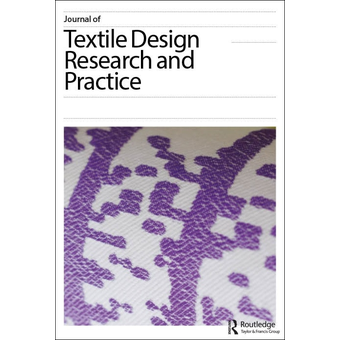Register
Event Details
The editors of the Journal of Textile Design Research and Practice would like to extend the recent themed call for papers to the new deadline of 28th February 2018 (see http://tinyurl.com/y8f4w4ck).
The Call Themes are:
1. Utilising Archives and Collections for Textile Education, Industry and Practice
2. Textiles and Co-creation
3. 'Bio' Textiles
Further detail is given below and is also available from the Journal of Textile Design Research and Practice websitehttp://tinyurl.com/y8f4w4ck.
Submissions can take one of the following forms and the instructions for authors page contains advice for authors.
Academic research papers (approximately 5,000 8,000) words;
Practitioner interviews or studies (approximately 6,000) words;
Position papers and reports of research currently in progress (approximately 3,000 words);
Book and exhibition reviews (approximately 500 2,000 words)
If you would like to discuss please contact Faith Kane - f.kane@massey.ac.nz
Call Themes
1. UtilizingArchives and CollectionsforTextile Education, Industry and Practice
Archives and collections exist as repositories of the past, containing artifacts and materials awaiting reactivation in order to discover new meaning. Textile designers, artists, researchers, historians and educators often use historical sources for reference and inspiration.
Increasingly, design company archives are used to promote brand heritage and for design reproduction and adaptation. This call invites submissions that address the theme of archive and collection utilization, specific focal points are not limited to, but could include the following:
- Learning from history and tradition
- Interpretation, appropriation, adaption and innovation
- Methodologies and creative approaches
- Archives and collections as pedagogy
- Collaborations with the heritage, museum and library sectors
- Engaging social groups and communities, local authorities and the public
- Valuing history to inform future generations
- Descriptions of collections and user-centered projects
- Copyright and intellectual property
2. Textiles and Co-creation
Digital platforms for the co-creation of textiles are providing opportunities for the consumer to become the designer. NIKEiD offering customised sportswear, shoes and backpacks was launched in 2012. Knit For You, an Adidas 2017 pop-up shop in Berlin, is researching and testing the concept of in-store production of custom knitted garments within four hours. Digital print bureaux such as Contrado and Spoonflower offer a range of fabric printing services for both interior and fashion applications including garment make-up, wallpaper and giftwrap. Platforms offer tuition in how to achieve colour matching and repeat designs. These emerging co-creation technologies have the potential to disrupt traditional textile design and manufacturing industries. This call welcomes submissions that address, but are not limited to, the following:
- Emerging models of co-creation that involve textiles and digital platforms. Who are the stakeholders? What are the costing models? What technologies are required? What is the consumer interface? Who are the beneficiaries?
- The barriers and enablers to adoption by consumers, retailers and textile manufacturing industries.
- The changing role of the textile designer. Who owns the design process? Will co-creation platforms facilitate the craft ofmaking-at-home?
- The sustainability effects of co-creation models. Will co-creation models result in reduced over-stocking or waste? Will consumer-led design lead to more sustainable and ethical supply chain practices?
- Co-creation as entertainment.
- Co-creation platforms as consumer research.
- Co-creation and social enterprise.
3. Bio Textiles
Continued movement towards circular and ethical design practices in textiles (and associated disciplines and industries) has led to the emergence of (or reconnection with) what might be termed bio textile practices. These practices range from re-conceptualizing the role of natural fibres, the conception and development of new biological and agricultural processes that result in alternative textiles/materials, the use of natural alternatives to harmful chemicals in textile coloration and finishing, to engagement with biodegradable and bio-based fibres and finishes. All draw on an interdisciplinary knowledge base and are often realized in design through hands-on engagement with materials and processes that are often central to textile design practice. In relation to this theme, this call welcomes papers that address, but are not limited to, the following focal points:
- Textile practices incorporating natural dyes
- DIY approaches to creating bioplastics, bio textiles and composite materials
- Growing your own textiles
- Design concepts around biodegradable textiles
- Coloration and finishing
- Using biological processes for textile design purposes
- New spaces for textile fabrication
- Bio textiles/materials and digital fabrication processes
- Sustainability benefits of bio materials (environmental, social, economic, cultural)
- Well-being benefits of bio textiles/materials
- Biomimicry
Further details can be found here: http://explore.tandfonline.com/pages/cfp/rftd-themed-cfp-7-2017


